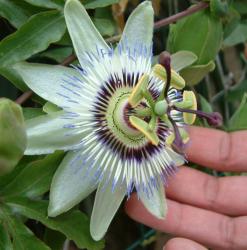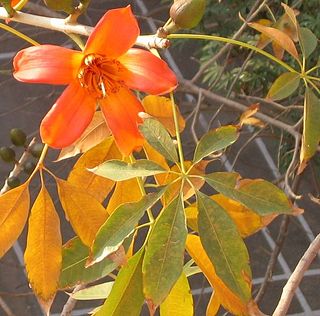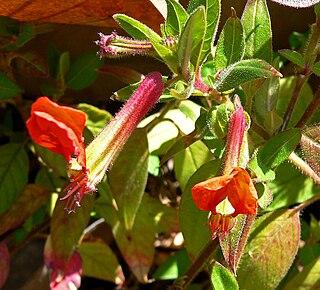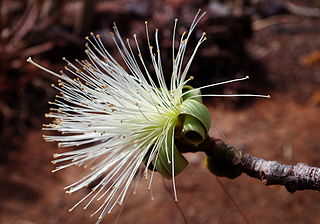
Convolvulaceae, commonly called the bindweeds or morning glories, is a family of about 60 genera and more than 1,650 species. These species are primarily herbaceous vines, but also include trees, shrubs and herbs. The tubers of several species are edible, the best known of which is the sweet potato.

The Juglandaceae are a plant family known as the walnut family. They are trees, or sometimes shrubs, in the order Fagales. Members of this family are native to the Americas, Eurasia, and Southeast Asia.

The Rhamnaceae are a large family of flowering plants, mostly trees, shrubs, and some vines, commonly called the buckthorn family. Rhamnaceae is included in the order Rosales.

The Passifloraceae are a family of flowering plants, containing about 750 species classified in around 27 genera.

Bombax is a genus of mainly tropical trees in the mallow family. They are native to western Africa, the Indian subcontinent, Southeast Asia, and the subtropical regions of East Asia and northern Australia. It is distinguished from the genus Ceiba, which has whiter flowers.

Echinocactus is a genus of cacti in the subfamily Cactoideae. The generic name derives from the Ancient Greek εχινος (echinos), meaning "spiny," and cactus. It and Ferocactus are the two genera of barrel cactus. Members of the genus usually have heavy spination and relatively small flowers. The fruits are copiously woolly, and this is one major distinction between Echinocactus and Ferocactus. Propagation is by seed.

Nyctaginaceae, the four o'clock family, is a family of around 33 genera and 290 species of flowering plants, widely distributed in tropical and subtropical regions, with a few representatives in temperate regions. The family has a distinctive fruit type called an accessory fruit or anthocarp, and many genera have extremely large pollen grains.

Cuphea is a genus containing about 260 species of annual and perennial flowering plants native to warm temperate to tropical regions of the Americas. The species range from low-growing herbaceous plants to semi-woody shrubs up to 2 m tall. Commonly they are known as cupheas, or, in the case of some species, as cigar plants. The generic name is derived from the Greek word κυφος (kyphos), meaning "bent," "curved," or "humped."

Dasylirion is a genus of North American plants in the asparagus family, all native to Mexico, with the ranges of three species also extending into the south-western United States. In the APG III classification system, it is placed in the family Asparagaceae, subfamily Nolinoideae.

Leucaena is a genus of flowering plants in the mimosoid clade of the subfamily Caesalpinioideae of the family Fabaceae. It contains about 24 species of trees and shrubs, which are commonly known as leadtrees. They are native to the Americas, ranging from Texas in the United States south to Peru. The generic name is derived from the Greek word λευκός (leukos), meaning "white," referring to the flowers.

Ruellia is a genus of flowering plants commonly known as ruellias or wild petunias. They are not closely related to petunias (Petunia) although both genera belong to the same euasterid clade. The genus was named in honor of Jean Ruelle (1474–1537), herbalist and physician to Francis I of France and translator of several works of Dioscorides.

Pseudobombax is a genus of flowering plants in the subfamily Bombacoideae of the family Malvaceae.

Grabowskia is a genus of flowering plants in the nightshade family, Solanaceae.

Odontonema, the toothedthreads, is a genus of flowering plants in the family Acanthaceae. It is native to Central America.

Karwinskia humboldtiana, commonly known as coyotillo, cacachila or Humboldt coyotillo, is a species of flowering shrub or small tree in the family Rhamnaceae. It is native to southern and western Texas in the United States as well as much of Mexico. The seeds and leaves of this plant contain the quinones eleutherin and 7-methoxyeleutherin and chrysophanol and β-amyrin in the fruits that are toxic to humans and livestock. The toxins typically induce paralysis, which is often followed by death. However, it often takes days or even weeks after consumption for the symptoms to manifest.

Lysiloma is a genus of flowering plants in the family Fabaceae.

Abronia, the sand-verbenas or wild lantanas, is a genus of about 20 species of annual or perennial herbaceous plants in the family Nyctaginaceae. Despite the common names, they are not related to Verbena (vervains) or lantanas in the family Verbenaceae. They are closely allied with Tripterocalyx.

Lilaeopsis schaffneriana is a rare species of flowering plant in the family Apiaceae known by the common names Schaffner's grasswort and cienega false rush.

Mitracarpus is a plant genus in the coffee family Rubiaceae. Girdlepod is a common name for some species in this genus.



















